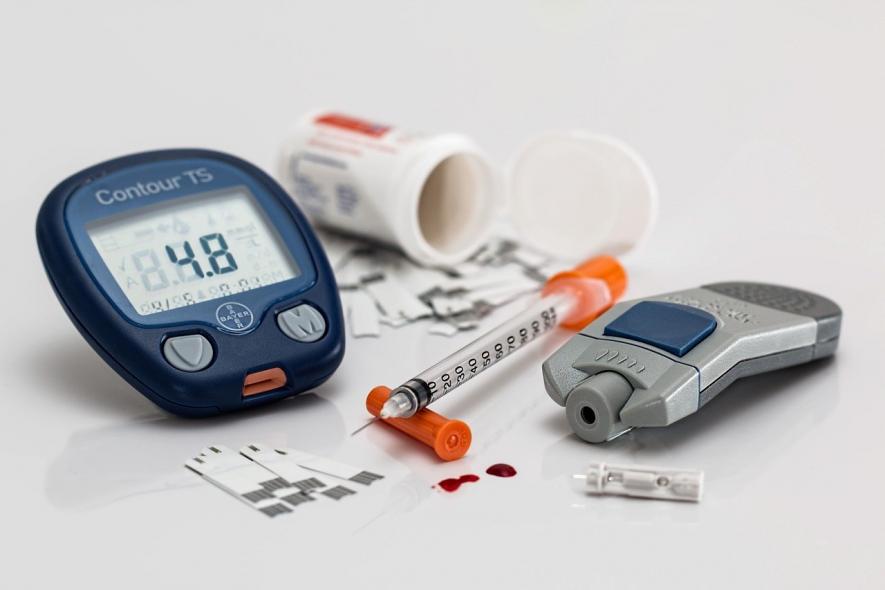Poor Awareness, Lack of Treatment are Key Challenges for Diabetes Reduction: ICMR Study

New Delhi: The prevalence of diabetes and impaired fasting glucose is high among adults in India, while the levels of awareness, treatment and control are still low, according to a recent paper by the researchers of the Indian Council of Medical Research-National Centre for Disease Informatics (ICMR-NCDIR), Bengaluru. The paper was published in the international journal, Frontiers in Public Health, on March 14, and provides a comprehensive picture of diabetes care in India.
The researchers used data from the National Noncommunicable Disease Monitoring Survey (NNMS). NNMS was a comprehensive, cross-sectional survey conducted in 2017–18 on a national sample of 12,000 households in 600 primary sampling units. In every household, one eligible adult aged 18–69 years were selected.
The study found that the prevalence of diabetes mellitus (DM) and impaired fasting blood glucose (IFG) in India was 9.3% and 24.5%, respectively. Among those with DM, 45.8% were aware, 36.1% were on treatment and 15.7% had it under control. More than three-fourths of adults approached the allopathic practitioners for consultation (84.0%) and treatment (78.8%) for diabetes.
Older adults were associated with an increased risk for DM and were 16 times more aware of DM. Better awareness, treatment and control levels were seen among adults with raised blood pressure and raised cholesterol. The prevalence of DM was two times higher in urban areas (14.3%) than in rural areas (6.9%). Urban areas also showed a high prevalence of IFG.
Diabetes is a rapidly growing health challenge, and a potential epidemic across the low- and middle-income countries like India. It is projected that by 2025, the number of people with diabetes in India would be 69.9 million, with a vast majority still undiagnosed.
“Care for chronic diseases like diabetes poses challenges characterised by the need for sustained compliance to treatment, prevention or management of associated complications. This requires the continuous engagement of health systems in the continuum of care at all stages,” the study said. Diabetes care requires coordination across all tiers of health care systems.
The Noncommunicable Disease (NCD) Monitoring Framework targets and indicators set by the Ministry of Health and Family Welfare (MoHFW), adapted from the Global NCD framework (World Health Organisation), calls for a need to halt the rise in diabetes and prevent premature deaths from NCDs by 25% by 2025. The researchers said that such targets can be met only with effective strategies at multi-sectoral levels.
“However,” they added, “an important limitation and quandary for policymakers is that the majority of the population might be unaware of their diabetes status and are not adherent to advice. Robust empirical data on diabetes prevalence, awareness, treatment, control and adherence is needed to comprehend the impact of initiatives taken to halt the growing burden of diabetes, response of health systems and health-seeking behaviours amongst the population.”
The study highlighted the importance of understanding where diabetics are lost in the care cascade, and monitoring progress in health system performance for diabetes management over time, is essential for targeted health interventions.
According to the 10th edition of the International Diabetes Federation’s (IDF) Diabetes Atlas, published in 2021, India is home to 7.4 crore diabetics between the age of 20 and 79 years, out of whom almost 4 crore (53.1%) are undiagnosed. The prevalence of diabetes in India is 9.6%, and will continue to increase over the years. 7.5 crores of people have IGF. According to the data, almost 6.5 lakh deaths were attributed to diabetes in 2021.
The study by ICMR-NCDIR recommended robust data management under the National Program for Control and Prevention of Cancer, Diabetes, Cardiovascular Diseases and Stroke (NPCDCS) for both public and private health facilities. It also highlighted the need for community-based implementation strategies for treatment and control like strengthening counselling services through grassroot health workers like the ASHAs (Accredited Social Health Activists).
Get the latest reports & analysis with people's perspective on Protests, movements & deep analytical videos, discussions of the current affairs in your Telegram app. Subscribe to NewsClick's Telegram channel & get Real-Time updates on stories, as they get published on our website.














